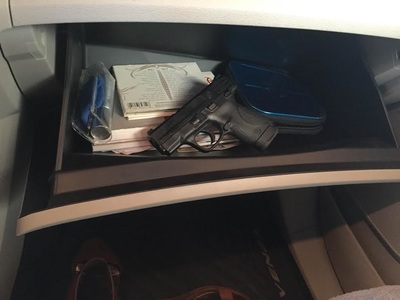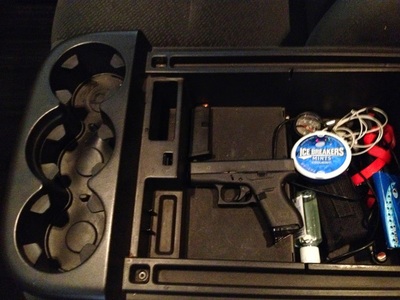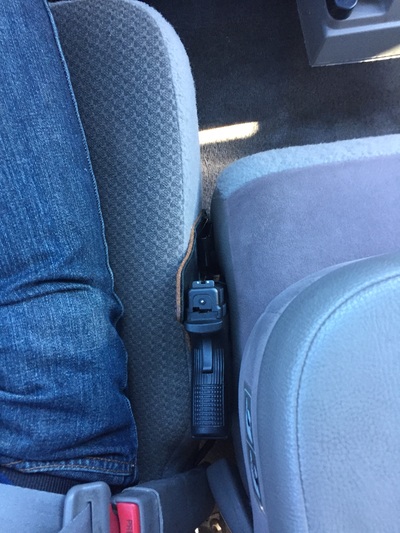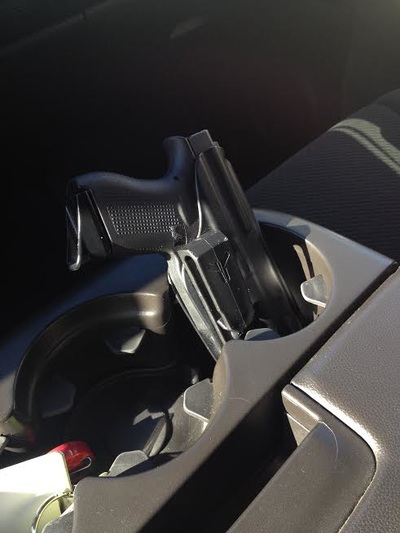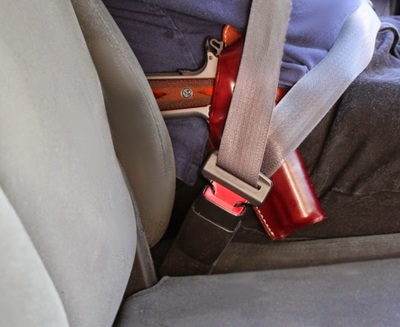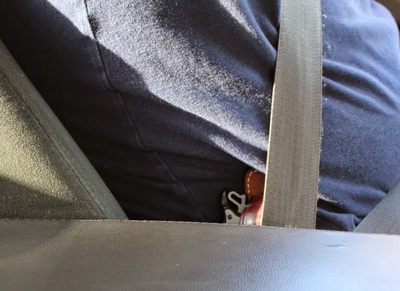Basic Firearm Carry Laws of Montana
Open Carry
Any person who is not otherwise prohibited from doing so by federal or state law may openly carry a weapon and may communicate to another person the fact that the person has a weapon (45-3-111)

Government buildings
Local governments may prohibit carrying of unpermitted concealed weapons or openly carried weapons to a publicly owned building under its jurisdiction 45-8-351. Many municipalities do ban firearms in these areas. One should carefully research the local county or municipal code. Changes in 2021 (see HB 102), have amended 45-8-328 to allow concealed weapon permittees to carry a concealed weapon in restricted portions of government buildings. Open carry is generally less regulated in certain areas than concealed carry, although in practice authorities may not understand the law. Concealed carriers have slightly more restrictions, which are listed on that page.
Local governments may prohibit carrying of unpermitted concealed weapons or openly carried weapons to a publicly owned building under its jurisdiction 45-8-351. Many municipalities do ban firearms in these areas. One should carefully research the local county or municipal code. Changes in 2021 (see HB 102), have amended 45-8-328 to allow concealed weapon permittees to carry a concealed weapon in restricted portions of government buildings. Open carry is generally less regulated in certain areas than concealed carry, although in practice authorities may not understand the law. Concealed carriers have slightly more restrictions, which are listed on that page.
Is open carry brandishing?
Brandishing is generally understood to involve drawing or aiming a firearm at a person to intimidate them or threaten them with violence. Montana does not have a brandishing statute, but municipalities may have their own ordinances.
Can I open carry a rifle or a shotgun?
Montana has no laws on carrying openly a long gun (rifle or shotgun). Please use discretion when doing so; while it is your right to carry a long gun in public, it does tend to alarm the public, even in gun-friendly communities. Pistols have been a normal part of daily self-protection throughout the United States since its inception and are intended for such daily carry purposes. Please don't carry long guns into Chipotle just to make a point; Montana allows you to openly carry handguns. Save openly carried long guns for dire circumstances when they're needed, such as a riot or a major disaster. Still, it's your right, so if you chose to openly carry a long gun, please exercise your right wisely.
Brandishing is generally understood to involve drawing or aiming a firearm at a person to intimidate them or threaten them with violence. Montana does not have a brandishing statute, but municipalities may have their own ordinances.
Can I open carry a rifle or a shotgun?
Montana has no laws on carrying openly a long gun (rifle or shotgun). Please use discretion when doing so; while it is your right to carry a long gun in public, it does tend to alarm the public, even in gun-friendly communities. Pistols have been a normal part of daily self-protection throughout the United States since its inception and are intended for such daily carry purposes. Please don't carry long guns into Chipotle just to make a point; Montana allows you to openly carry handguns. Save openly carried long guns for dire circumstances when they're needed, such as a riot or a major disaster. Still, it's your right, so if you chose to openly carry a long gun, please exercise your right wisely.
"Concealed weapon" means any weapon [...] that is wholly or partially covered by the clothing or wearing apparel of the person carrying or bearing the weapon [...] (48-8-315)
45-3-111 Openly carrying weapon
(1) Any person who is not otherwise prohibited from doing so by federal or state law may openly carry a weapon and may communicate to another person the fact that the person has a weapon (warning to discourage an attack and not just limited to open carry).
(2) If a person reasonably believes that the person or another person is threatened with bodily harm, the person may warn or threaten the use of force, including deadly force, against the aggressor, including drawing or presenting a weapon.
(1) Any person who is not otherwise prohibited from doing so by federal or state law may openly carry a weapon and may communicate to another person the fact that the person has a weapon (warning to discourage an attack and not just limited to open carry).
(2) If a person reasonably believes that the person or another person is threatened with bodily harm, the person may warn or threaten the use of force, including deadly force, against the aggressor, including drawing or presenting a weapon.
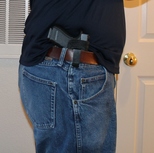 Technically concealed in Montana
Technically concealed in Montana
If I use an inside the waistband holster (IWB), is that open carry?
No, firearms cannot be covered by any clothing at all without being considered concealed. Firearms and/or their holsters must be completely exposed to view. This does not include a holster as the statute specifically refers to clothing covering the firearm. The pictures method requires a concealed weapon permit unless done outside of city/town limits.
This method is known as ‘Virginia Tuck’, stemming from a former Virginia law where concealed carry was illegal in bars, so patrons would tuck their shirt behind the pistol butt to be considered openly carried.
No, firearms cannot be covered by any clothing at all without being considered concealed. Firearms and/or their holsters must be completely exposed to view. This does not include a holster as the statute specifically refers to clothing covering the firearm. The pictures method requires a concealed weapon permit unless done outside of city/town limits.
This method is known as ‘Virginia Tuck’, stemming from a former Virginia law where concealed carry was illegal in bars, so patrons would tuck their shirt behind the pistol butt to be considered openly carried.

No guns signs
No guns signs do not have the force of law on private property. Failure to leave or disarm would only be trespassing. New language in HB 102 (2021) allows restricting the ability to carry on private property where the owner forbids it, but makes no mention of signage. You must be asked to leave or disarm; signs alone do not have the force of law. Note: The ambiguity presents a legal question that has not been settled, however, the current common understanding is that the "forbidding" refers to verbal notification and not signage. Hotel owners and landlords are prohibited by law from banning firearms, 70-24-110.
No guns signs do not have the force of law on private property. Failure to leave or disarm would only be trespassing. New language in HB 102 (2021) allows restricting the ability to carry on private property where the owner forbids it, but makes no mention of signage. You must be asked to leave or disarm; signs alone do not have the force of law. Note: The ambiguity presents a legal question that has not been settled, however, the current common understanding is that the "forbidding" refers to verbal notification and not signage. Hotel owners and landlords are prohibited by law from banning firearms, 70-24-110.
School Carry

Firearms are prohibited in school buildings, 45-8-361. It is not illegal under state law to carry a firearm in parking lots and on school grounds (local regulations may differ). Parents are also liable for children that bring firearms into schools. The trustees of a district may grant persons and entities advance permission to possess, carry, or store a weapon in a school building. "School building" means all buildings owned or leased by a local school district that are used for instruction or for student activities.
Can I carry a gun near a school? Don't I have to be 1000 feet away?
This is a federal law that is not enforced by Idaho law enforcement and there is no applicable similar Idaho law (unlike some states). You generally will not be prosecuted unless you are doing something else illegal, such as involved in gang activity or drug violations, that interest federal law enforcement. The law was intended to apply to drug dealers and gang members, not the law abiding citizen.
The Gun-Free School Zones Act of 1990 (GFSZA) basically states that one cannot "knowingly to possess a firearm [...] in "a school zone." 'School zone' is defined as "in, or on the grounds of, a public, parochial or private school; or (B) within a distance of 1,000 feet from the grounds of a public, parochial or private school." It includes all public roads and sidewalks within that 1,000 foot buffer zone. It does not apply on private property, to a licensed concealed firearm permittee (state law does prohibit guns on campuses except with written authorization), or an unloaded weapon in a locked container/rack.
The law was found unconstitutional in its original version, so, to skirt the constitutional issue, the language was altered to say that it was a matter of 'interstate commerce' as all guns have moved in interstate travel as part of manufacturing and shipping and thus under the authority of Congress.
Montana has nullified the GFSZA by designating all law-abiding citizens who are not violent felons to be licensed by default for the purposes of this section, 45-8-360.
This is a federal law that is not enforced by Idaho law enforcement and there is no applicable similar Idaho law (unlike some states). You generally will not be prosecuted unless you are doing something else illegal, such as involved in gang activity or drug violations, that interest federal law enforcement. The law was intended to apply to drug dealers and gang members, not the law abiding citizen.
The Gun-Free School Zones Act of 1990 (GFSZA) basically states that one cannot "knowingly to possess a firearm [...] in "a school zone." 'School zone' is defined as "in, or on the grounds of, a public, parochial or private school; or (B) within a distance of 1,000 feet from the grounds of a public, parochial or private school." It includes all public roads and sidewalks within that 1,000 foot buffer zone. It does not apply on private property, to a licensed concealed firearm permittee (state law does prohibit guns on campuses except with written authorization), or an unloaded weapon in a locked container/rack.
The law was found unconstitutional in its original version, so, to skirt the constitutional issue, the language was altered to say that it was a matter of 'interstate commerce' as all guns have moved in interstate travel as part of manufacturing and shipping and thus under the authority of Congress.
Montana has nullified the GFSZA by designating all law-abiding citizens who are not violent felons to be licensed by default for the purposes of this section, 45-8-360.
Campus Carry (colleges/universities)
HB 102 was declared unconstitutional and thrown out by the Montana State Supreme Court. The bill would have prohibited universities and colleges from banning holstered firearms on campus.

While local governments can regulate firearms in public buildings under their control, state universities and community colleges are not subject to the city's jurisdiction unless there is an local ordinance that applies to the campus. Under 45-8-351, municipalities can prohibit open or concealed carry in "publicly owned building" under their jurisdiction. This law is silent on whether or not this means a publicly owned building under their own jurisdiction (city buildings) or if this applies to even state-owned buildings. Based on exemptions for security guards at the state capitol and a proposed amendment, "publicly owned building" likely can be interpreted to cover all state, federal, and local government buildings.
Butte, Great Falls, Hamilton, Havre, and Helena which all have state university campuses, prohibit firearms in "publicly owned buildings" without distinction to which public entity owns the building. The rest of the cities only prohibit firearms at city owned property, not state. Missoula specifically excludes the state university. Helena has the following ordinance:
Butte, Great Falls, Hamilton, Havre, and Helena which all have state university campuses, prohibit firearms in "publicly owned buildings" without distinction to which public entity owns the building. The rest of the cities only prohibit firearms at city owned property, not state. Missoula specifically excludes the state university. Helena has the following ordinance:
It shall be unlawful, and a misdemeanor, for any person [...] other than [...] a citizen in the protection of his life or that of his family or his property [...]
(1) To carry on or about his person, in any place open to the public, any loaded or concealed firearm, rifle, airgun or pistol within the limits of this city [...] [and]
(2) To possess any firearm, airgun or pistol at a public assembly, in a city park, school, or in any publicly owned building [...]
Car Carry

Montana has no laws regulating firearms in vehicles. Firearms are only regulated within government and school buildings. Local municipalities can regulate firearms at "public assemblies" and parks under their jurisdiction, which may include parking lots.
Can I keep a loaded gun in my car without a permit?
It is legal for a person who is outside the city/town limits or the confines of a logging, lumbering, mining, or railroad camp or who is lawfully engaged in hunting, fishing, trapping, camping, hiking, backpacking, farming, ranching, or another outdoor activity in which weapons are often carried to carry a concealed firearm, 45-8-317(i).
Can I open carry a handgun in a car?
Yes. Your pistol can be holstered on you or can be visible on a seat, in the center console, in a cup holder or it can be placed out of sight in a glove box, case, or under the seat. It cannot be partially covered by your clothing (unless outside of town/city limits or with a concealed weapon permit.
Does my gun have to be visible in my car?
No. Guns in cars may be anywhere; in the glove box, center console, map pocket, under the seat, in the trunk, in a cargo box, on the dash, in a cup holder, on the seat, in a gun case, in a purse, etc. The firearm does not have to be visible, except that concealed carry on the body (in a concealed holster or in a pocket) does require a permit. Open carry in a car is permissible. See the gallery below.
Can I carry a gun in my purse, in a bag, or in a gun case without a concealed weapon permit?
Yes. As long as the gun is not physically on your body, it is not considered a concealed weapon. A purse on the seat or floor would be perfectly legal. That firearm in a bag or case, carried in the hand or out of the vehicle on foot, would be considered a concealed firearm and would require a permit, although there is no known cases of prosecution for innocent transport (i.e. going to/from the range).
So I'm open carrying in my car. What if the something gets in the way? Does the officer have to be able to see my gun?
As long as the gun is carried in a manner that would be considered open carry if you got out of the car and stood up, it is legal. A gun that is hidden by the officer’s angle of view or a part of the vehicle (seat belts, center console, etc.) is not considered to be concealed. A gun in a car may be kept inside a bag, purse, or glove box or otherwise not visible as long as it is not concealed on the body (without a concealed firearm permit). See the gallery below.
If the police pull me over, do I have to tell them there is a gun in the car (or show my permit)?
No, Montana has no ‘duty to inform’ law upon police detention; it is your discretion to inform the officer. Police do have a right to conduct a pat-down search and temporarily seize a weapon during a detention when they have probable cause to suspect a crime or a threat to their safety.
Can I keep a loaded gun in my car without a permit?
It is legal for a person who is outside the city/town limits or the confines of a logging, lumbering, mining, or railroad camp or who is lawfully engaged in hunting, fishing, trapping, camping, hiking, backpacking, farming, ranching, or another outdoor activity in which weapons are often carried to carry a concealed firearm, 45-8-317(i).
Can I open carry a handgun in a car?
Yes. Your pistol can be holstered on you or can be visible on a seat, in the center console, in a cup holder or it can be placed out of sight in a glove box, case, or under the seat. It cannot be partially covered by your clothing (unless outside of town/city limits or with a concealed weapon permit.
Does my gun have to be visible in my car?
No. Guns in cars may be anywhere; in the glove box, center console, map pocket, under the seat, in the trunk, in a cargo box, on the dash, in a cup holder, on the seat, in a gun case, in a purse, etc. The firearm does not have to be visible, except that concealed carry on the body (in a concealed holster or in a pocket) does require a permit. Open carry in a car is permissible. See the gallery below.
Can I carry a gun in my purse, in a bag, or in a gun case without a concealed weapon permit?
Yes. As long as the gun is not physically on your body, it is not considered a concealed weapon. A purse on the seat or floor would be perfectly legal. That firearm in a bag or case, carried in the hand or out of the vehicle on foot, would be considered a concealed firearm and would require a permit, although there is no known cases of prosecution for innocent transport (i.e. going to/from the range).
So I'm open carrying in my car. What if the something gets in the way? Does the officer have to be able to see my gun?
As long as the gun is carried in a manner that would be considered open carry if you got out of the car and stood up, it is legal. A gun that is hidden by the officer’s angle of view or a part of the vehicle (seat belts, center console, etc.) is not considered to be concealed. A gun in a car may be kept inside a bag, purse, or glove box or otherwise not visible as long as it is not concealed on the body (without a concealed firearm permit). See the gallery below.
If the police pull me over, do I have to tell them there is a gun in the car (or show my permit)?
No, Montana has no ‘duty to inform’ law upon police detention; it is your discretion to inform the officer. Police do have a right to conduct a pat-down search and temporarily seize a weapon during a detention when they have probable cause to suspect a crime or a threat to their safety.

Permitless concealed carry
Concealed carry is legal for a person who is outside the city/town limits or the confines of a logging, lumbering, mining, or railroad camp or who is lawfully hunting, fishing, trapping, camping, hiking, backpacking, farming, ranching, or another outdoor activity in which weapons are often carried, 45-8-317(i). This includes inside a vehicle.
Concealed carry is legal for a person who is outside the city/town limits or the confines of a logging, lumbering, mining, or railroad camp or who is lawfully hunting, fishing, trapping, camping, hiking, backpacking, farming, ranching, or another outdoor activity in which weapons are often carried, 45-8-317(i). This includes inside a vehicle.
